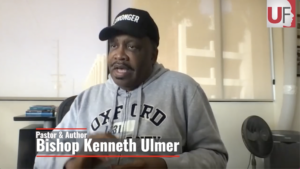Talking About Race: An Interview with Bishop Kenneth Ulmer

Bishop Kenneth Ulmer has been pastoring for decades in Inglewood, CA. He has seen more than his fair share of racism on the streets and on stages across the country. But he has recently launched a campaign to work toward racial understanding and reconciliation that has captured the attention of Christians across racial lines. UrbanFaith contributor Maina Mwaura sat down with him to discuss his work to confront racism and bring people together. The below interview is edited for length and clarity.
Maina
You’ve been around for a long time, you’ve seen the ups and downs when it comes to race? Why did you decide to get involved with such an event like this, for people to come together and talk about this important topic?
Bishop Ulmer
I think you just answered it, it is the the importance of coming together. And talking about it, you know, the Bible does a passage where the Bible says, Come, come, let us reason together. And our efforts is simply first of all, to start with coming together, which, especially in these days of division, and schisms, and “isms” that should be “was-ims” all the divisions in the body of Christ, just coming together is an achievement. Yes, I’ve been doing this for a while…and I don’t think I have ever in my life or ministry seen a season and a time where the world is as divided. But more importantly, and more grievously more painful, is that the church is likewise significantly divided. And I think what bothers me is that many don’t know, don’t realize it, or didn’t get the memo, or whatever. And we’re kind of going on in business as usual.
But it is not, as usual, but in many cases, in terms of COVID, and everything, will never be the same. The issue is, what are we going to look like on the other side of this, and the exhortation is, don’t come out of this empty handed. Don’t come out of this, having learned nothing, haven’t having achieved anything, having made no progress. Look around, reach around, grab around for what God is saying to you. I would say, What is God saying to the church? You know, the exhortation of, of John, he did have ears. Here, listen, get it, catch it, what the Spirit is saying to the church, what he is saying, you know, the Prophet said, God is doing a new thing. And I love that verse. And I think it’s Isaiah 43, where it says…don’t miss this…don’t you see that God is doing a new thing? And so I think, ultimately, our gathering is to come together, to reason to wrestle to dialogue, even to dispute and debate. You know, what are you hearing God’s saying, what is God saying, now? What are the words of the marching orders for the body of Christ, when we come through this thing, and of course, all of us would admit that we didn’t know we, we did, none of us knew we would still be in it this long.
And, I gotta tell you, I’m not a prophet, not a son of a prophet, but I think things may get worse before they get better. And by that, I mean, this is not going to be a quick fix. It’s a major cultural shift. And there’s a major cultural shift as relates to the body of Christ as relates to the mandate the commission of the church.
Maina:
Why do you enjoy talking about race? Like you don’t mind embracing it. Like you don’t mind stepping into it. When a lot of people are going, I think I’ll avoid that conversation. What do you enjoy about it?
Bishop Ulmer
I think it’s the new frontier. I say we’re in the desert. I think it’s the new battlefield. And I think it’s a battlefield where God can God desires. And I declared God will get glory. But it’s a battle we cannot avoid. It’s a battle we cannot did not it’s a reality that we cannot deny. But I think I think it is it’s one of those desert lands, is one of those wilderness lands, is one of those battles that God is going to bring us through. But the idea is you got to… I love that passage where in Second Chronicles, where God says to the Prophet Joshua, “Look, the battle is mine. The battle is not yours. I got this.” But then he says, “but tomorrow, you got to go to the battlefield.” Whoa, whoa, whoa, if the battle is yours, Lord, why can’t I watch you take it now? I’ll just be the cheerleader on assignment. God said No, no, no, it’s my battle. When I win through you.
And I think it’s a season where it’s those of us who are willing to take the risk of going into the battle that is in fact God’s, and that God will win. I have some white friends who admit, and I love them for admitting, “Man, I can’t even afford this.” Like I know a couple of white friends of mine who said some public stuff [that cost them]. [A friend and I] did a video about George Floyd and everything. And I have I noticed friends of mine who stood up and talked about the oneness in the body of Christ and racism and stuff. And that friend had a back door revival. He had members of families, some of them longtime families who left his church just for admitting just for mentioning it. And so, I think there’s a price to it, and I have some friends who are not willing to pay that price. But my only excitement is [that] I think it is the new battlefield where God will get glory. But he needs soldiers like us to take the battlefield.
